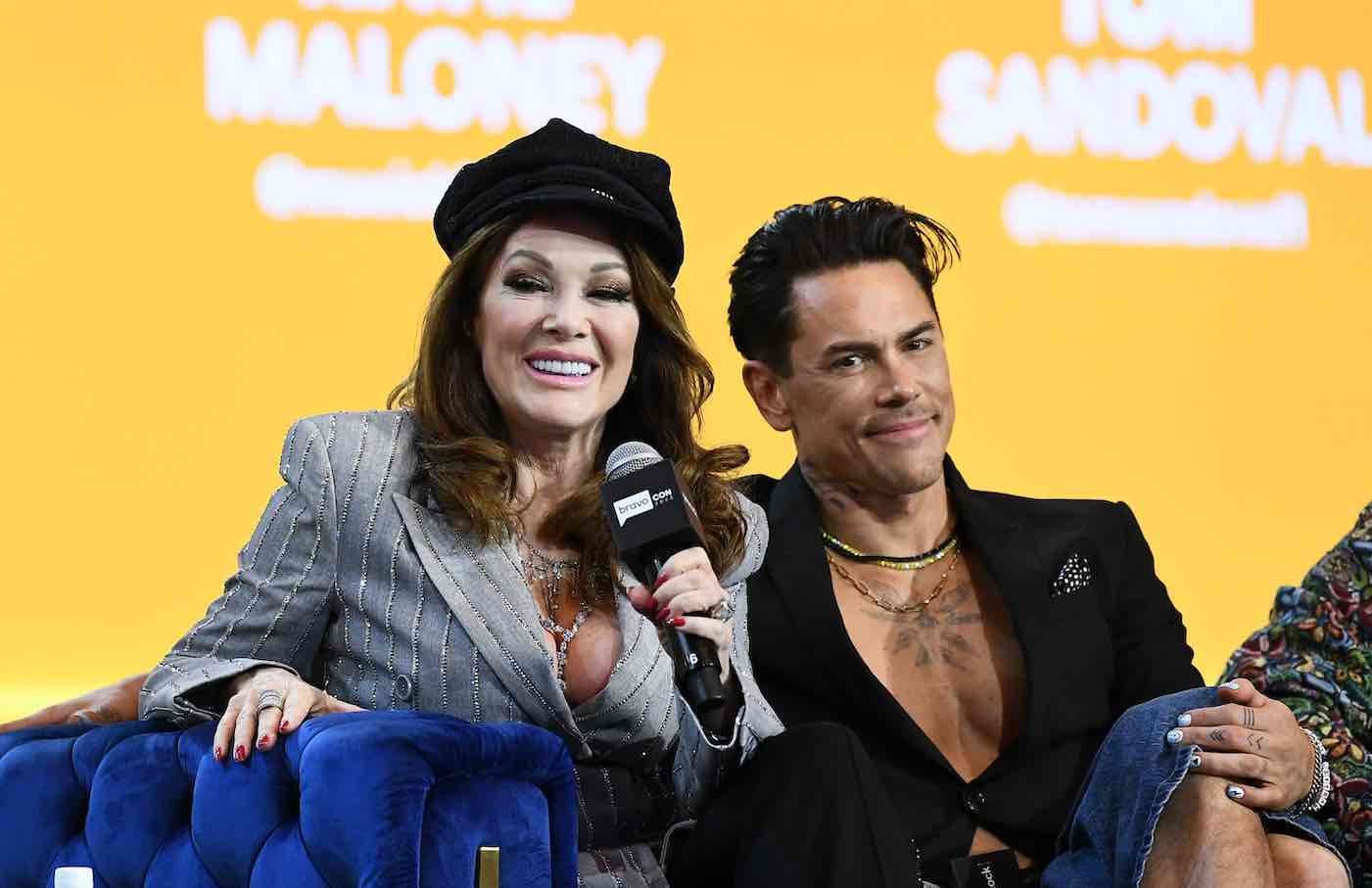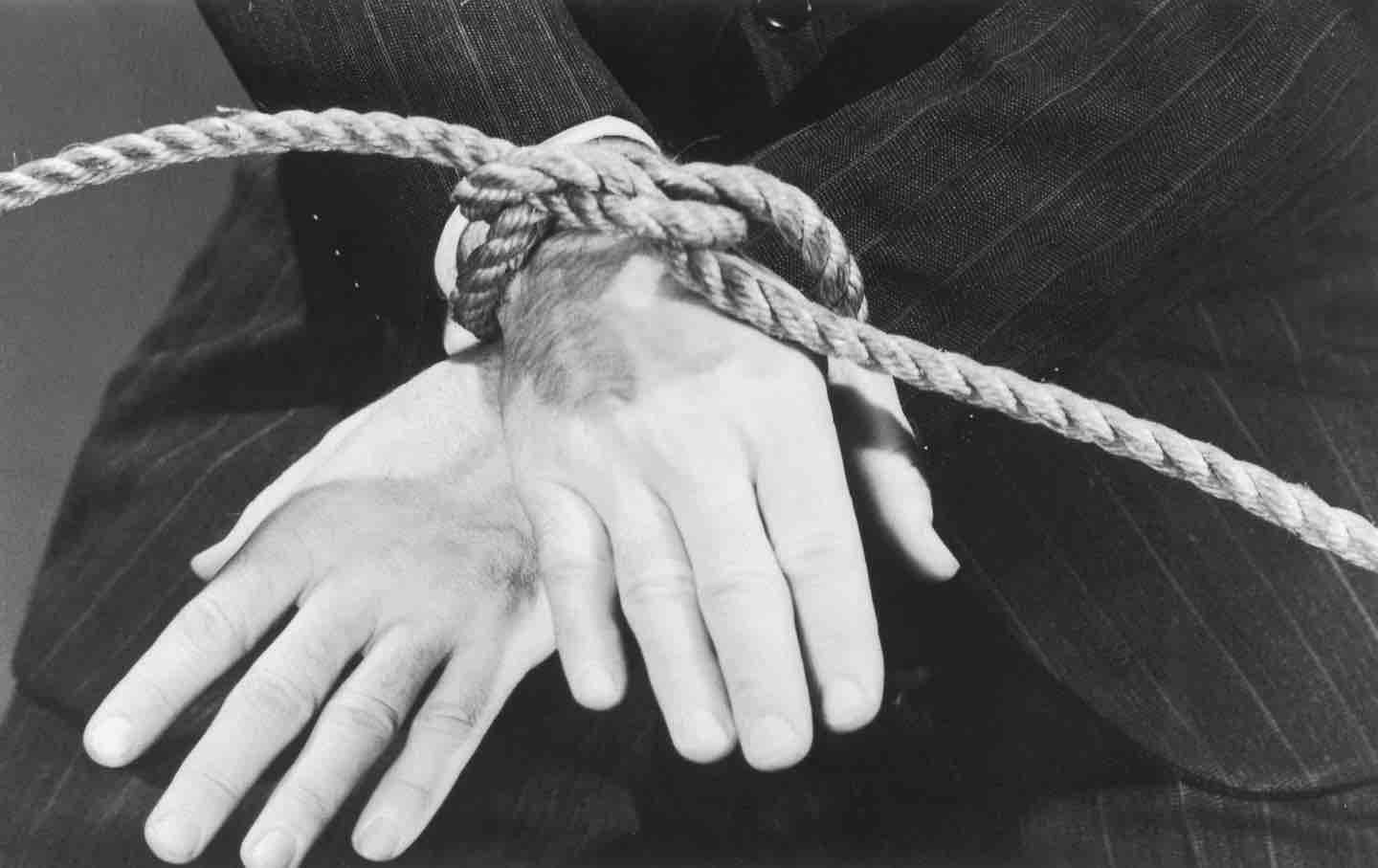Are Autofiction and Reality TV the Same?
A conversation with the literary critic Anna Kornbluh on her new book Immediacy, a searing indictment of a newly prevalent aesthetic of verisimilitude and the first person.

Lisa Vanderpump and Tom Sandoval, of Vanderpump Rules, at Bravocon in Las Vegas, Nevada, 2023.
(Photo by Bryan Steffy / Bravo via Getty Images)What do the Real Housewives franchises have in common with Karl Ove Knausgård? According to the critic Anna Kornbluh, they both speak to our century’s dominant aesthetic: immediacy. What Kornbluh is referring to is the project of replicating reality that autofiction and Bravo-style television share. Both promise that some version of what we are reading or watching actually happened, offering the pleasure of feeling like we’re in on a secret—so long as we’re willing to forget how much editing likely took place after the fact.
Kornbluh is no fan of immediacy. She thinks it blurs our ability to pay attention to our increasingly awful reality. Immediacy, she writes, “simply manifest[s] viscerally affecting stuff” without critiquing it, letting the audience have a purely emotional reaction that leads nowhere. In contrast, she argues, “A painting isn’t an efficient way to send a message or achieve a goal, but beholding its inefficient indirection can stimulate thought.” A painting, in other words, helps our minds wander. I would add that a good painting is something our minds might later wander back to. Kornbluh thinks anything in the immediate style is the opposite. Immediacy art, she argues, is designed to be consumed instantly, with the rapt, titillated attention of the voyeur, then forgotten as soon as it’s done.
For Kornbluh, stimulating thought is often, though not always, a political project. She wants art to challenge its audience to think in new ways about inequality, climate crisis, the doom that often seems to approach from all sides. She contends that one of the major problems with immediacy art is that, by generating no distance between subject and reader or viewer, it abdicates the responsibility of creating—or pushing us to create—new perspectives. Whether that’s entirely true, I don’t know, but in the months since reading Immediacy, I have found myself returning over and over to the question of whether a book I’m reading or a movie I’m watching is too efficient. Often, I realize that the answer is yes, just after I realize that I’m bored.
I spoke with Kornbluh about her new book, Immediacy: or, The Style of Too Late Capitalism, including the nature of immediacy, the problems with first-person fiction, and the reasons why she’d choose horror movies over reality TV any day. This interview has been edited for length and clarity.
—Lily Meyer
Lily Meyer: What is your basic definition of “immediacy”?
Anna Kornbluh: Immediacy is the negation of mediation—the canceling, diminishment, or flattening of the substance that we associate with social meaning, aesthetic representation, or the slow processing of images and ideas. We see this in an intolerance for art, or for television and literature that is impersonal or not subject to rapid interpretation—anything that isn’t transparent. We also see a rejection of some of the conventional density that we might associate with other kinds of knowledge or genres, like theory.
LM: When did you begin worrying that contemporary art and pop culture were thin or flat in a bad way?
AK: I had an ambient sense that the kinds of critical and consumer demands that were being made of aesthetic objects were that they needed to telegraph their messages; they needed to be very flat; and they needed to make their ideas readily accessible. It seemed like people thought it is somehow elitist if there has to be interpretation. I had that sense around general ways that people were reacting to television and film and literature. But it’s also ambiently in politics or ideology, certain kinds of demands for representation and recognition that seem to be very untextured: the idea that we need a diverse candidate for some executive position (CEO or the like), but it doesn’t matter if that person has any commitment to racial equity or justice.
In a more scholarly way, the origin of my book was rooted in being a person who reads, teaches, and writes books about the history of the novel and 19th-century fiction, which is so often framed in the third person. In my pleasure reading, I just kept finding only first-person work. Contemporary prize winners, best-of lists, what was showing up in the bookstores and on my nightstand—all first-person. I just couldn’t figure out where the third person was, and wondering why everything was “I” seemed to put a face, or a persona, on that ambient sense I was having.
LM: Why does the first person trouble you? And what about modernist or postmodern literature that uses the first person liberally, whether it is Ulysses or a more contemporary example like Anna Burns’s Milkman?
AK: First person’s dominance bothers me as a piece of evidence for a broader evacuation of fictionality. Of course, there are thick, complex first-person novels being written in the present, and first-person narration hasn’t always functioned the same way across the history of the novel. And Ulysses is so famously difficult in part because the first-person voice gets so tangled with exterior tributaries of thought, and the reader has to work to track the voice.
LM: In part, you’re saying that Ulysses is inefficient, which is an artistic quality you praise in the book. Can you explain why inefficiency is important to you?
AK: Well, the problem (or the point) of art is that it is indirect. It is not saying things as straight as possible; it has detours and weirdnesses and nonintuitive meanings that demand that we work on them a little bit, that we process them. For me, that demand—the need to engage in reflection and learning in order to appreciate what’s going on in a work of art or literature—is inefficient, sure, but it’s also counter to what makes contemporary art economically viable: its expressivity. We’re in a productivity crisis, but also a moment in which commodities and services can be exchanged very rapidly for profit. That economic condition is shaping our aesthetics right now.
LM: Would it fit into your argument to say that part of why we’re drawn to immediacy is that very few American workers are producing something real that they get to hold or keep?
AK: Absolutely. Most postindustrial service-economy or information-economy workers are generating services: social reproduction, care work, creative products over which they don’t get ownership. In the arts, people’s access to creative professions are being diminished because it’s so hard to make a living. And then so much industrial labor has been outsourced out of the G7 economies. So what we’re left with is circulation—exchanging things faster and faster—for profit and value, and that speed becomes our horizon for imagining.
LM: How does the climate crisis inform immediacy, or your response to it?
AK: Immediacy means that artists and critics and consumers are just renouncing the human desire to imagine. Human beings have made abstract art since before they had clothing, ritual burial, any of the things that we would take as markers of behavioral modernity or progress or civilization. So art is integral. Playful expression for no reason is integral to who we are. So if we’re quitting creativity voluntarily, does that mean we’re stamping out what is essential to our species?
More concretely, the climate crisis—no matter how much inertia we show in response to it—gives us this feeling of urgency. I think it makes artists worry we don’t have time for mediation, that we have to set aside art and do real messaging. And I think some of what I call “immediacy style” could be meaningfully tethered to this sense of extinction grief. But that’s a problem, because the climate crisis, in all its urgency, demands mediation. It demands frameworks of meaning that we can share and use to plan—which is not an immediate thing.
LM: Climate fiction is an emerging subgenre of literary fiction—I’m thinking, for example, of Lydia Millet’s recent novels, or Lydia Kiesling’s Mobility. What do you make of those books? And why do you think there isn’t more contemporary art (across all forms) that addresses climate change?
AK: Mobility is pretty top of my list for the best books of 2023. What I like is that its way of engaging with the climate crisis is through historical fiction, not by conjuring a frightening future. It is also narrated in the third person, which helps not only to span historical time but as well to correlate interior to exterior, psyche to environment. And its themes concern not the cli-fi standards of human cruelty, but the powerful longing of a young girl to just be normal and how that scales up to the inertia and denialism of our oil oligarchs.
I much prefer Mobility to the growing body of literature that does address the climate crisis directly—too directly, without mediation. Books like that work in the modes of didactic dystopia and sadistic forecast. At the same time, there are quite a number of writers and artists who seem to be invested in immediacy in a way that says: “There’s no time for art. Who needs a metaphor? Mediation is a luxury.” I think we need galvanizing (not terrorizing) narratives; we need complex understanding of causes (not graphic depiction of effects); we need utopian visions of the future (not rapey dystopias)—we need collective meaning.
LM: One truism of MFA programs is that art shouldn’t be didactic—which I don’t buy into, necessarily, but I don’t want all art to be didactic. How would you react to a reading of your book, or of your ideas about climate fiction, that says you’re just asking artists to be teachers?
AK: Art thinks. It thinks differently than philosophy or logic or everyday-mindedness, but it thinks. When we respond to this thinking, when we think with it, we learn things, for sure, but I am less asking for didactic art than for art that doesn’t give up on thinking—that doesn’t actively attack the possibility of concept-making, of relating beyond the self, of resonance beyond presence, of making more than what we experience. It’s a prescriptive proposal, but I think that is criticism’s job: to prepare the paths for art.
LM: Do you think there’s a sense in which immediacy style is lazy?
AK: I try not to use moral terms, but I do think that it’s unworked and disdaining of work. A bunch of the fiction writers I talk about have this idea that making things—making things up—is illegitimate. I don’t see that as lazy. It’s a genuine commitment to intensity, or what they would style as humility.
I do think the economy of speed can be associated with laziness, but it’s about overwork, too. We have to hurry up and consume and get the message because we’re working so many more hours, or working multiple jobs. And that leads us to art that’s literal, or opposed to metaphor: art that takes shortcuts to intensity with sadistic violence, graphic body stuff, and so on.
LM: Speaking of graphic body stuff, in your chapter on TV, you often use “immediate” and “visceral” as synonyms, which made me wonder whether TV or movies can be visceral but not immediate. How would that work?
AK: One of the ways of understanding popular film genres—horror, melodrama, porn—is that they do stuff to our bodies that is somehow viscerally affecting. I watch porn and I’m excited; I watch melodrama and I cry; I watch horror and I jump. But crucially, there is the idea of genres. When you watch horror, let’s say, you’re watching one movie inside a preexisting tradition, which adds meaning. So yes, it’s visceral, but you also process it through the history of its genre.
What’s different about the TV or movies I’m analyzing is that they’re anti-genre. One of the manifestations of immediacy, to me, is the idea that genre itself is oppressive. You get all this tragicomedy, or stuff that you can’t even tell what it belongs to—and often that stuff is visceral in terms of sex or violence. It’s intensity outside of meaning. It startles you out of looking at four screens at the same time, but it doesn’t demand any processing.
LM: Your writing is very different from a lot of academic prose: It’s slang- and meme-filled, often alliterative. How is that style related to your subject?
AK: I struggled intensely to find the right voice here. In some ways, the book is bombastically encyclopedic—claiming Airbnb and autofiction go together, you know? So I wanted a stylistic manifestation of that brashness or bigness. I also wanted it to have a kind of conversational, pedagogical voice—some chattiness, like I’d use in the classroom.
But I also wanted to not only have intuitive meaning, or only one idiom; it was important to shift levels in the prose, to be able to go from meme talk to big, old Marxist philosophical debates. I wanted both to talk to different kinds of readers and to ask readers to go to different kinds of places, which maybe creates some unevenness in the book’s style.
One of the joys of writing, to me, is trying on different styles. I love playing with language: getting some plump, delicious adjectives in a sentence, working out some rhythms that might be gratifying. It’s fun. In this book, though, style gave me a lot of grief. I’m pretty sure this book is correct—that its main idea is right. But I am incredibly worried about not having executed it in a convincing way, and a style failure would be a big manifestation of that.
We cannot back down
We now confront a second Trump presidency.
There’s not a moment to lose. We must harness our fears, our grief, and yes, our anger, to resist the dangerous policies Donald Trump will unleash on our country. We rededicate ourselves to our role as journalists and writers of principle and conscience.
Today, we also steel ourselves for the fight ahead. It will demand a fearless spirit, an informed mind, wise analysis, and humane resistance. We face the enactment of Project 2025, a far-right supreme court, political authoritarianism, increasing inequality and record homelessness, a looming climate crisis, and conflicts abroad. The Nation will expose and propose, nurture investigative reporting, and stand together as a community to keep hope and possibility alive. The Nation’s work will continue—as it has in good and not-so-good times—to develop alternative ideas and visions, to deepen our mission of truth-telling and deep reporting, and to further solidarity in a nation divided.
Armed with a remarkable 160 years of bold, independent journalism, our mandate today remains the same as when abolitionists first founded The Nation—to uphold the principles of democracy and freedom, serve as a beacon through the darkest days of resistance, and to envision and struggle for a brighter future.
The day is dark, the forces arrayed are tenacious, but as the late Nation editorial board member Toni Morrison wrote “No! This is precisely the time when artists go to work. There is no time for despair, no place for self-pity, no need for silence, no room for fear. We speak, we write, we do language. That is how civilizations heal.”
I urge you to stand with The Nation and donate today.
Onwards,
Katrina vanden Heuvel
Editorial Director and Publisher, The Nation








